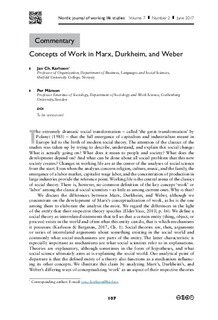Concepts of Work in Marx, Durkheim, and Weber
Journal article, Peer reviewed
Published version
Permanent lenke
http://hdl.handle.net/11250/2560182Utgivelsesdato
2017-06Metadata
Vis full innførselSamlinger
Originalversjon
Nordic Journal of Working Life Studies. 2017, 7 (2), 107-119. https://doi.org/10.18291/njwls.v7i2.81597Sammendrag
The extremely dramatic social transformation – called ‘the great transformation’ by Polanyi (1985) – that the full emergence of capitalism and industrialism meant in Europe led to the birth of modern social theory. The attention of the classics of the studies was taken up by trying to describe, understand, and explain this social change: What is actually going on? What does it mean to people and society? What does the development depend on? And what can be done about all social problems that this new society creates? Changes in working life are at the center of the analyses of social science from the start. Even when the analyses concern religion, culture, music, and the family, the emergence of a labor market, capitalist wage labor, and the concentration of production in large industries provide the reference point. Working life is the central arena of the classics of social theory. There is, however, no common definition of the key concept ‘work’ or ‘labor’ among the classical social scientists – as little as among current ones. Why is that? (...)
